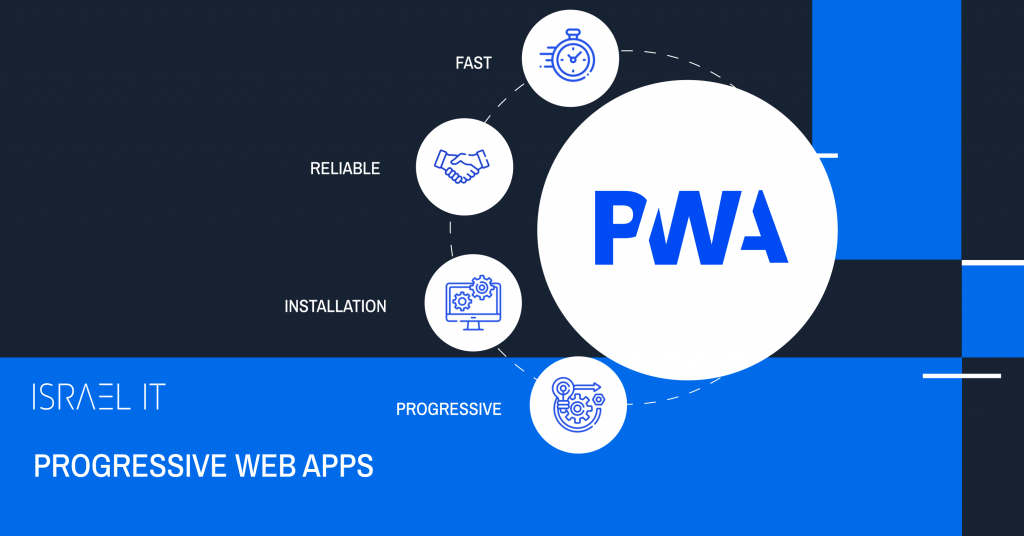What first comes to your mind when you hear the phrase “to install an app”? The majority of people are likely to think of mobile apps. There are two major ecosystems for mobile applications: Apple’s iOS and Google’s Android. However, having just one of these is inconvenient for most businesses; they prefer everything in one place. For years, large corporations have debated whether a mobile web or a mobile app is better. Finally, in 2015, PWAs was introduced – a symbiosis of the two.
What is a Progressive Web app?
PWAs (Progressive Web Apps) is the most powerful trend in mobile web development today. Hundreds of major brands have realized the benefits of progressive web apps for their businesses. They choose PWA to provide customers with a smooth mobile user experience.
PWA stands for Progressive Web Application — a website that looks and performs exactly like a mobile app. It is displayed on Google Chrome just like any other web page. A typical user would perceive it as an application rather than a website. In other words, we can say that PWAs is a browser-based native app that can be installed on the mobile home screen, send push notifications, and work offline or with a weak connection. Pinterest, Starbucks, Twitter Lite, Forbes, and others are among the most popular PWAs.
The benefits of PWAs
Research shows that users are unwilling to download and keep many apps on their devices. That is why progressive web apps may be the next phase in mobile web optimization. They are lightweight and don’t require a time-consuming installation. Let’s look at some characteristics of progressive web apps to see why businesses, from startups to established market leaders, should use them:
- Accessible offline
PWAs, like native apps, can be accessed without an internet connection. It is done by caching the app’s data ahead of time. This caching is accomplished through the use of a service worker, which provides programmatic methods of caching resources. In the retail industry, the app is highly valuable because even if the internet goes down, users can still view the information they previously accessed. If the information is new, they will be redirected to a special offline page.
- Works like a native app
PWAs have the look and feel of mobile apps, but perform like websites. Furthermore, PWAs and Native apps have the same effect on user experience, but the first one also includes website features like dynamic data and database access. Search engines such as Bing, Google, and others index and find PWA pages quickly. Most PWAs leverage existing frameworks and UX/UI to provide better user experiences than traditional websites.
- Quick and easy to install
PWAs can be installed directly from a web browser on any device, which significantly improves user experience. The installed app stays on the desktop or mobile device’s home screen and is easily accessible from there. It is also not necessary to install the PWA app in order to access it; instead, it can be accessed via a URL. Users regard the app as credible, flexible, and reliable due to the ease with which it can be accessed. A PWA, like a mobile app, has its own icon on phones and tablets.
- Enhanced performance
The running speed of Progressive Web Apps improves because it can function efficiently, operate like a website, cache, and serve text, images, and other content. This type of software enhances not only the speed of a load page, but also user experience, retention rates, and customer loyalty. As a result, if you own a retail or content service business, this type of app is ideal for you!
- Works everywhere
PWAs can work from anywhere. Users who frequently switch between devices can get cross-support anywhere. This is done to meet the needs of the consumer, maintain a comprehensive experience, and contribute to business automation. Progressive Web Applications are highly responsive to different form factors and adapt well to different screen sizes.
- Updates silently
Progressive Web Apps updates are automatic. Every time the user opens the app, it updates instantly without installing any bulk changes. However, not all the PWAs update silently. If such a feature exists in the app, it will send its user a push notification informing about the new update arrival.
- Sends push notifications
PWAs, like native apps, also have a push notification feature. This is excellent for businesses and their ad campaigns. What makes this technology so special? Users allow their PWAs to send them notifications, and these notifications are noticeable on mobile screens. As a result, businesses have a better chance of reaching their target audience, reaching out to their users more frequently, and becoming more recognized as a brand.
- Require no app distribution platforms
We can now download apps from a variety of distribution platforms. The App Store, Google Play, and Microsoft Store, for example, each have their own set of requirements for software stored on their servers. Meeting these requirements can become a burden at times, and the app may be removed without notice. By using PWAs, you are free of distribution platform requirements, as well as potential time & cost waste.
- More efficient security
As said before, PWAs use HTTPS to manage and maintain the security of data stored within them, thus also eliminating the risks of security breaches, snooping, content tampering, and other illegal activity.
- Eliminating the development cost
When it comes to working on different devices and adjusting to different screen sizes, PWA becomes a good investment. PWA reduces both the developer’s time and the customer’s costs. Developing PWAs can help you save money while increasing your customer conversion rate.
Conclusion
PWA is a growing technology that many experts believe will shape the future of mobile development. Many data-driven business apps, that are not supposed to be built and deployed natively, will definitely be developed as PWAs. There is no reason to spend a lot of time and money developing native apps if they are ideal PWA candidates. Are you looking for PWA developers for your project? Get in touch with us and let’s start something new together. Our specialists will build an application that will take your business to the next level!




